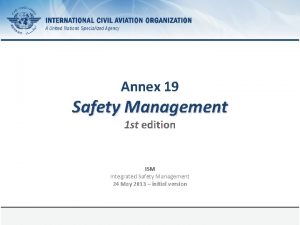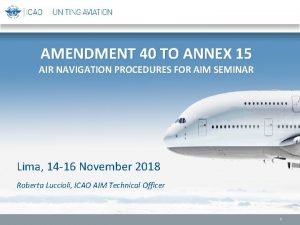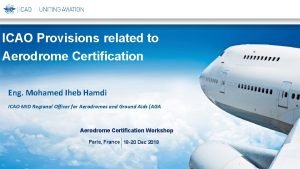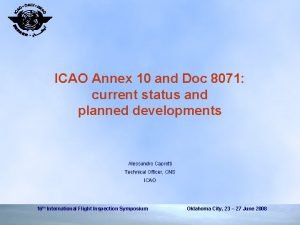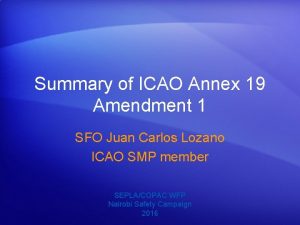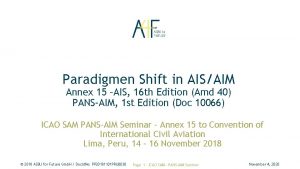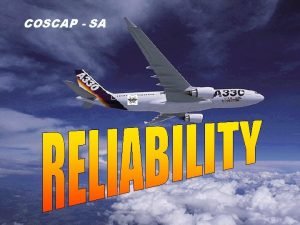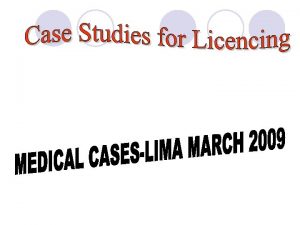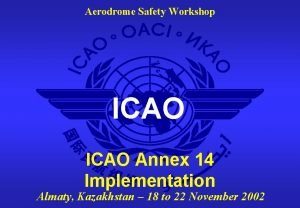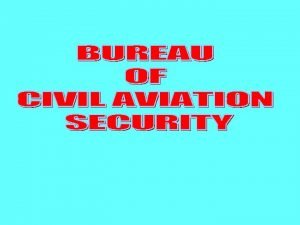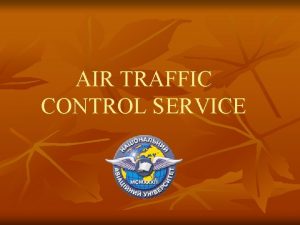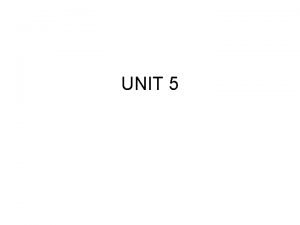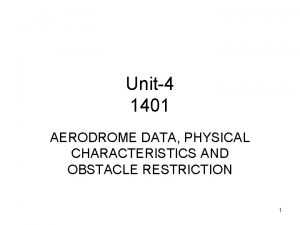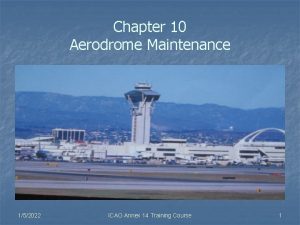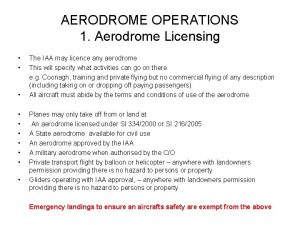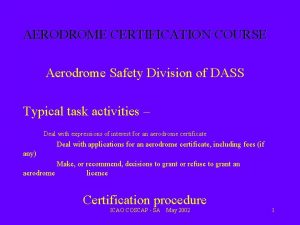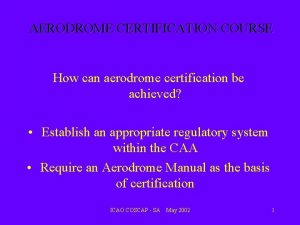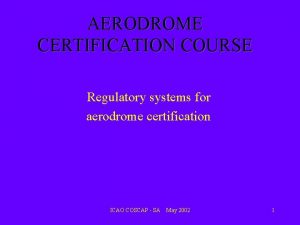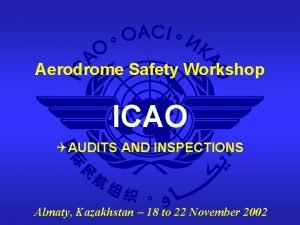RELATING ICAO ANNEX 14 TO AERODROME OPERATIONS Diane














- Slides: 14

RELATING ICAO ANNEX 14 TO AERODROME OPERATIONS Diane Howard, B. S. , J. D. , L. L. M. Arsenault Doctoral Fellow in Space Governance Mc. Gill University Institute of Air and Space Law diane. howard 814@gmail. com

Introduction • Practical realities: from whence do these activities spring? • HTHL, Air or balloon drop HL – winged suborbital craft • US approach • European approach • Chicago Convention Annex 14 • What it is, what it covers…

Practical realities

Different approaches • US model • License approach • Launch and reentry activities, vehicles, and launch sites (spaceports) – all as spacecraft. DOT FAA AST • Protect public safety, promote US interests, remain compliant with US international obligations • Operator bears full responsibility for operations

Different approaches • European model (so far) • Treats as aircraft. • Applies the ICAO definition in Annex 8 of the Chicago Convention • “an aircraft is any machine that can derive support in the atmosphere from the reactions of the air other than the reactions of the air against the earth’s surface. ” • Whether the suborbital craft receives support from the atmosphere for the greatest percentage of the flight. • Certificates of airworthiness as per EASA and ICAO • Certifying authority bears some portion of responsibility • Sites from where flown or launched are considered aerodromes • NPA 2011 -20 (combined) • Annex 14 of the CC

More reality • No matter how you classify, or where you define airspace and outer space as ending and beginning, once a vehicle gets to a certain point, sovereignty over airspace ends and space law precepts control.

Chicago Convention Annex 14 • 1944 • roots in Paris International Conference of 1910 and Paris Convention of 1919. • To develop international civil aviation in a safe and orderly manner • Also contains technical annexes, incorporated into CC • Not absolutely binding upon States • Work in progress • Airways systems, air traffic control practices, standards (SARPs)

Chicago Convention Annex 14 • Standards and Recommended Practices (SARPs) • Recommendations of the Aerodromes, Air Routes and Ground Aids Division in third (1947) and fourth (1949) sessions • Technical specifications adopted in accord with Article 37 of the CC • “Each contracting State undertakes to collaborate in securing the highest practicable degree of uniformity in regulations, standards, procedures, and organization in relation to aircraft, personnel, airways and auxiliary services in all matters in which such uniformity will facilitate and improve air navigation. ” • Included in list of covered subjects are licensing and operating mechanical personnel, log books, accident investigation

Chicago Convention Annex 14 • Annex 14: Physical characteristics and obstacle limitation surfaces of aerodromes NOT the operation of aircraft. • Acknowledges differences in ownership, operation, and oversight between States parties • States are mandated to certify aerodromes used for international operations in accord w Annex 14 and relevant ICAO specs • Runways (Chapter 2), airfields and obstacles (Chapters 4 -7), operations (including fuel service facilities (Chapters 8 -10) • Annex 11: Air traffic services

Apples to apples? • Runways • Airfields • Obstacles (Section 1. 1) • Operations (Chapter 9) • Electrical systems (Chapter 8) • Fire protection (Section 2. 11, Chapter 9) • Surface Movement (Chapter 9) • Maintenance (Chapter 10) • • • Vehicle Assembly Buildings (VAB) Fuel service facilities Rocket-engine test stands Aircraft reconditioning and/or storage facilities Launch and recovery complex (incl. launch pads) Cryogenic plant

Apples to apples? • ATC tower/Central Control Facility (Annex 11) • Satellite station for TT&C • Support, planning, and administration • Administrative services • Host services • Shared or by carrier • Ancillary structures and entities • Flight crew and passenger (sfp) processing • Medical screening and treatment • Training • Pilot/crew schools • Tourist amenities (hotel, attractions, retail space)

What, if anything, does this mean to us?

Relevance • FAA authority over AST as well as airports • transition in airport certification scheme underway now. Could be a good time to begin interfacing on this issue. • Infrastructure is already in place • Common physical elements between some spaceports and airports • Starting place for baseline standards (lighting, runway marking) particularly for any spaceport/airports already functioning within the international civil aviation community • What direction will Europe go?

the long and winding runway • What can we do now? • Discuss and brainstorm • IAASS guidelines • Ideas? Lessons learned to share?
 Aerodrome definition icao
Aerodrome definition icao Annex 19 safety management
Annex 19 safety management Annex 15 icao
Annex 15 icao Icao annex 14 chapter 9
Icao annex 14 chapter 9 Icao annex10
Icao annex10 Icao annexes 1 to 19
Icao annexes 1 to 19 Icao annex 15
Icao annex 15 Icao annex 6
Icao annex 6 ıcao annex 1
ıcao annex 1 Icao annex 14 summary
Icao annex 14 summary Icao annex 17 baggage reconciliation
Icao annex 17 baggage reconciliation Aerodrome control service
Aerodrome control service Touchdown zone markings
Touchdown zone markings Minimum safe altitude chart
Minimum safe altitude chart Aerodrome certification
Aerodrome certification

